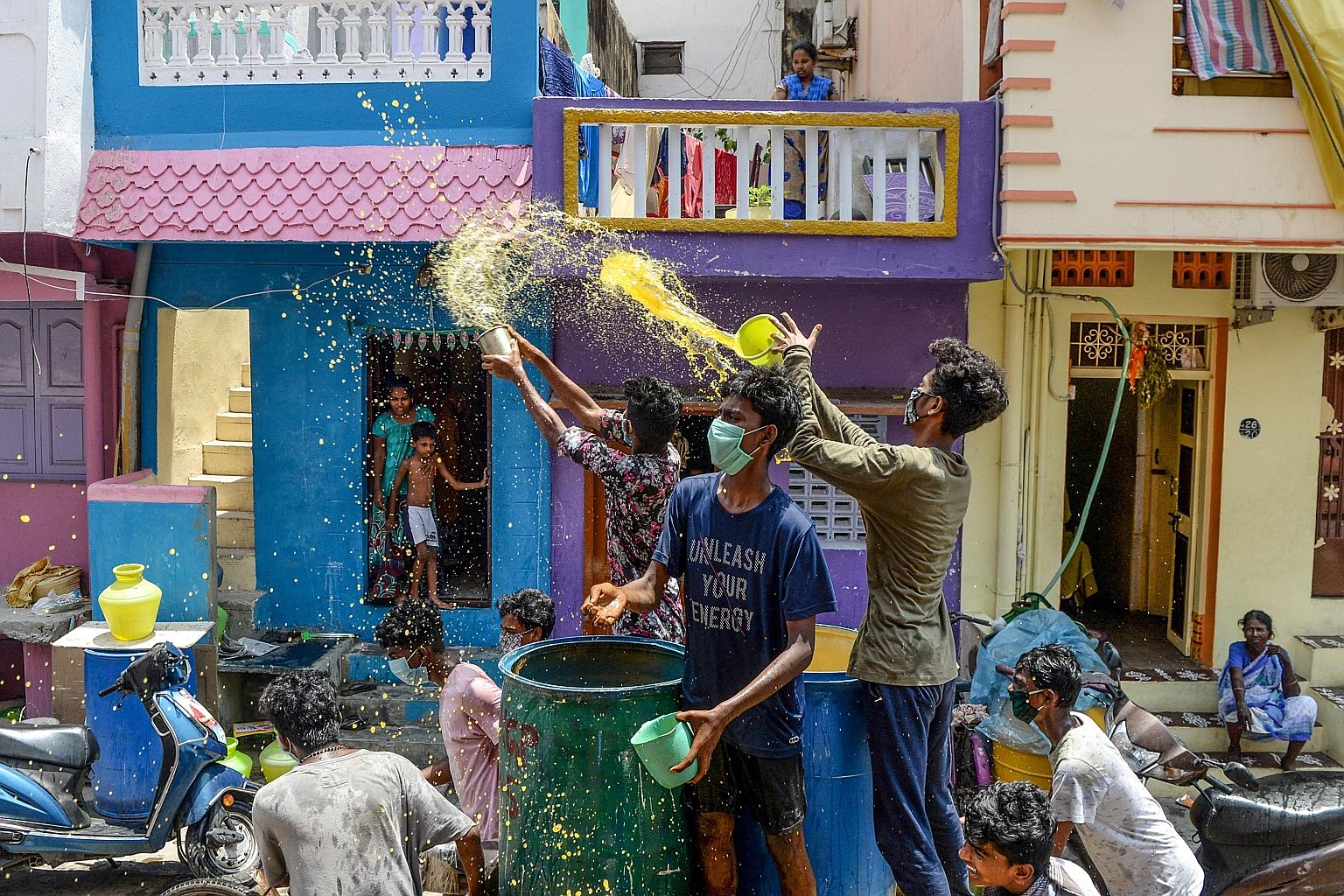Coronavirus pandemic
India reverses ban on anti-malaria drug's export
This follows Trump's warning of retaliation as demand for drug in Covid-19 cases rises
Sign up now: Get insights on Asia's fast-moving developments

Volunteers throwing a mixture of water, neem herb and turmeric as an alleged natural disinfectant on a street in a residential area of Chennai yesterday as India remained in lockdown amid the coronavirus pandemic.
PHOTO: AGENCE FRANCE-PRESSE
Debarshi Dasgupta India Correspondent In New Delhi, Debarshi Dasgupta
Follow topic:
India will supply two key drugs - paracetamol and hydroxychloroquine - being used to treat Covid-19 patients to countries that have been "badly affected" by the pandemic, the Ministry of External Affairs (MEA) said yesterday.
This reverses an April 4 decision that had banned all exports of hydroxychloroquine, and follows growing global pressure on India, including from US President Donald Trump, to allow the export of these life-saving drugs.
"In view of the humanitarian aspects of the pandemic, it has been decided that India would license paracetamol and hydroxychloroquine in appropriate quantities to all our neighbouring countries who are dependent on our capabilities," Mr Anurag Srivastava, the MEA spokesman, said.
"We will also be supplying these essential drugs to some nations who have been particularly badly affected by the pandemic," he added.
The most vocal demand for India to resume exports of hydroxychloroquine has come from the United States, with Mr Trump on Monday warning India of retaliation over its decision to ban its export. The anti-malaria drug was developed decades ago but has become a coveted product in recent weeks as it is believed to be effective in the treatment of Covid-19.
"If he (Indian PM Narendra Modi) doesn't allow it to come out, that would be okay, but of course there may be retaliation. Why wouldn't there be," Mr Trump said at a White House press briefing. He had also spoken to Mr Modi last Saturday, urging him to release the drug for export to the US.
Anticipating a rise in demand for hydroxychloroquine, given the rapidly growing number of coronavirus cases in India, the Directorate-General of Foreign Trade (DGFT) had restricted the drug's export on March 25. It said it would allow exports only from firms that had already received full payment prior to the government's order or if the drugs were being exported from special economic zones or export-oriented units to fulfil pre-existing obligations. Exports on humanitarian grounds were also exempted from the ban.
On April 4, however, the DGFT issued a fresh order that expanded the ban "without any exception".
Coronavirus cases in India have risen sharply from just 110 on March 15 to 4,421 yesterday.
The Ministry of Health and Family Welfare on March 31 amended treatment guidelines for Covid-19 patients and recommended a regimen comprising hydroxychloroquine and azithromycin as an "off-label indication". While a recent study in France showed that the anti-malarial drug may help mitigate the impact of the novel coronavirus, doctors across the world are still divided on the drug's efficacy.
Its use also comes with potential side-effects such as vision loss and heart problems but its demand has grown significantly in the US, where Mr Trump has endorsed it emphatically. "I may take it," he had said last week. "We're just hearing really positive stories, and we're continuing to collect the data," Reuters quoted him as saying.
Mr Trump's remarks calling for retaliation have prompted criticism from Indian opposition leaders, some of whom have even accused the government of capitulating to American pressure.
Following the MEA's statement yesterday, Congress leader Rahul Gandhi tweeted: "Friendship isn't about retaliation. India must help all nations in their hour of need but life-saving medicines should be made available to Indians in ample quantities first."
Data compiled by Bloomberg Intelligence shows 47 per cent of the US' supply of the drug last year came from India, the world's biggest maker of generic drugs. Some of India's largest pharmaceutical firms, including Cipla, Ipca, Wallace and Zydus Cadila, produce hydroxychloroquine using active pharmaceutical ingredients (API) sourced from foreign, particularly China, as well as domestic sources.
Media reports have already indicated a surge in the price of APIs used to make hydroxychloroquine.

